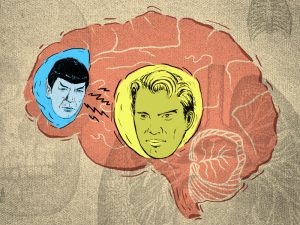
Parent – “Why did you do that, you knew that was not allowed!”
Child – “I don’t know why, it just seemed like the thing to do at the time.”
The one gender difference in brain development that most scientists agree on is that the prefrontal lobe, the part of our brain called the executive decision maker, does not complete development in females until somewhere between 18-22 and in males between 20-25. This information has been used to explain why adolescent boys are more likely to be impulsive, engage in risky behavior, and make poor decisions.
In working with teachers and students, I point out that this developmental difference is not an excuse for boys to misbehave, but it does explain why they may find it more difficult to do so. The point is that boys need to develop skills in self-control and learn to manage themselves, not to depend on adults to create appropriate boundaries.
Some teachers have found it hard to deal with when I tell them that disciplining their male students will not teach the boys better behavior. All that happens is that the boys learn not to exhibit that behavior in front of adults. As I point out to teachers, you may be able to make sure that the student behaves inside your classroom, or even inside your school, but he has only learned what not to do. What he needs is to learn positive behaviors which he can use in his life outside of school.
Recent research indicates that may not be enough either. A study reported that young adolescents were perfectly able to control themselves when they were asked to perform a driving game as long as they were alone. They did not make rash decisions, they drove carefully, and completed the task safely in the same way that adults did. However, when the children were part of a crowd of other adolescents, they were twice as likely to engage in impulsive behavior and less likely to make reasoned decisions.
What is fascinating is that adults in the same situations, first alone and then with a group of age mates, did not engage in riskier behavior when they were in a crowd. And that’s the core point: that when you are talking to your child about the decisions that he makes, he is not being influenced by his peers. He knows what he is supposed to do, and gives you the answers that you want to hear. Once he is with a group of friends, it’s as if being in that group hijacks his ability to make good decisions, and he becomes rash and irresponsible.
How do you help inoculate your boy against letting his brain be turned to “the dark side?” First of all, tell him what happens in his brain. Give him the article referenced above so that he will hear this information from someone other than his parents or his teachers. After all, he knows that what we have to say is wrong (parenting is not for the faint of heart).
Second, encourage him to be part of groups where adults are present. That is the point of scouting, 4-H, sports teams, interest clubs (robots, drones), academic competitions (Destination Imagination, Odyssey of the Mind), community service tasks, or any other of a host of adult-facilitated community youth activities. Make sure that the adults take their duties seriously and are present while the children are engaged in the activity. Properly run, these activities will give your son the opportunity to engage with age-mates in tasks which are supervised, but can only be successfully accomplished through risky behavior.
Third, give your child the space to make mistakes. Let him invite a group over to watch or play a game, and help him plan how to feed his friends. When the guys are gone, if there is evidence of irresponsible behavior such as food not properly disposed of, or furniture not replaced where it normally resides, he needs to clean up after his buddies. He may then learn that there are consequences for rash behavior.
Finally, when your son gets his driver’s license, do not let him drive with more than one underage friend in the car at a time. Some locations have laws that prevent adolescents from having any other unrelated teens in the car with them unless an adult is also present. If your area does not have this law, have your son look up areas that do and point out why these laws exist.
Remember, your son can make reasoned decisions and can control his impulses as long as no other adolescents are around him. Make sure he knows that and keep him accountable for his actions. Some children believe that the slower development of their prefrontal lobe gives them a free pass for bad behavior. It does not and they need to know that.
